Here are some key points about these alternatives:
Biodegradable Wipes: Biodegradable adult wipes are designed to break down more easily in the environment compared to traditional wipes. They are typically made from materials that are biodegradable, such as plant-based fibers or cellulose. These wipes are formulated to degrade naturally over time, reducing their impact on landfills.
Compostable Wipes: Compostable adult wipes are specifically designed to be composted in industrial composting facilities. They are made from materials that can fully break down into organic matter under controlled composting conditions. Composting these wipes helps divert waste from landfills and contributes to nutrient-rich soil production.
Flushable Wipes: Flushable adult wipes are formulated to disintegrate and break down in water, allowing them to be flushed down the toilet. However, it’s important to note that not all wipes labeled as “flushable” are suitable for all plumbing systems. Some wipes may still pose a risk of clogging pipes or causing sewer blockages. It is essential to follow the manufacturer’s instructions and any local regulations regarding flushable wipes.
Sustainable Materials: Manufacturers are exploring the use of sustainable materials for adult wipes. This includes utilizing fibers from renewable resources, such as bamboo or plant-based cellulose, which require less energy and resources to produce compared to traditional synthetic materials.
Reduced Packaging: Environmentally friendly adult wipes often come with reduced packaging to minimize waste. This can include using recyclable or biodegradable packaging materials or opting for minimalistic packaging designs.
When choosing environmentally friendly adult wipes, it’s important to look for certifications or labels that verify their eco-friendly claims. China best wet wipes for adults suppliers Some common certifications to watch for include “Biodegradable,” “Compostable,” “FSC Certified” (indicating responsible sourcing of materials), or “Water UK Fine to Flush” (indicating compliance with flushability standards set by water authorities in the UK).
However, it’s important to note that even with environmentally friendly options, proper disposal is crucial. If disposing of wipes in the trash, they should be placed in appropriate waste bins instead of being littered. If flushing is an option, it should be done responsibly, following guidelines and recommendations from manufacturers and local wastewater authorities.
As the demand for sustainable products increases, it’s expected that more environmentally friendly options for adult wipes will continue to emerge, offering consumers choices that align with their environmental values.
What are some examples of sustainable materials that are being used in the production of adult wipes?
Several sustainable materials are being used in the production of adult wipes as alternatives to traditional synthetic materials.
Here are some examples:
Bamboo Fiber: Bamboo is a fast-growing and renewable resource that requires less water and fewer pesticides compared to other crops. Bamboo fiber is soft, absorbent, and naturally antibacterial, making it an attractive option for sustainable adult wipes.
Plant-Based Cellulose: Cellulose fibers derived from sustainable plant sources, such as wood pulp or cotton, are commonly used in eco-friendly adult wipes. These fibers are biodegradable and can be sourced from responsibly managed forests or organic cotton farms.
Lyocell: Lyocell, also known as TENCEL™, is a type of cellulose fiber made from sustainably sourced wood pulp, typically from eucalyptus trees. Lyocell fibers are known for their softness, absorbency, and eco-friendly production process.
Recycled Materials: Some adult wipes are made using recycled materials, including recycled fibers or post-consumer recycled plastics. By utilizing recycled content, these wipes help reduce the demand for virgin materials and divert waste from landfills.
Organic Cotton: Organic cotton is grown without the use of synthetic pesticides or fertilizers, making it a more environmentally friendly option compared to conventionally grown cotton. Adult wipes made from organic cotton are free from potentially harmful chemicals and are biodegradable.
Hemp Fiber: Hemp is a highly sustainable crop that requires minimal water and pesticides to grow. Hemp fiber is strong, absorbent, and naturally antimicrobial, making it suitable for use in adult wipes.
Corn Fiber: Corn fiber, also known as Ingeo™, is a biodegradable and compostable material derived from cornstarch. It is used as an alternative to conventional synthetic fibers in some eco-friendly adult wipes.
PVA (Polyvinyl Alcohol): Polyvinyl Alcohol is a biodegradable synthetic material that can be used as a binder or as a component in wet wipe substrates. It breaks down naturally in the environment without leaving harmful residues.
These are just a few examples of sustainable materials used in the production of adult wipes. Manufacturers are continually exploring and adopting new sustainable options as the demand for eco-friendly products grows. When looking for sustainable adult wipes, check for certifications such as FSC (indicating responsible sourcing) or certifications from organizations like the Global Organic Textile Standard (GOTS) or the Forest Stewardship Council (FSC) to ensure the authenticity of the sustainable claims.

